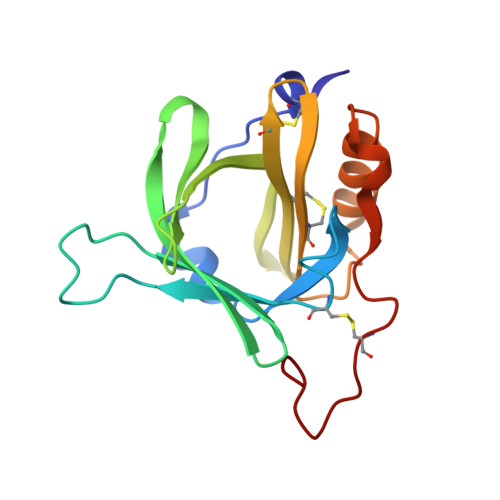R-hydroxynitrile lyase from the cyanogenic millipede, Chamberlinius hualienensis-A new entry to the carrier protein family Lipocalines.
Motojima, F., Izumi, A., Nuylert, A., Zhai, Z., Dadashipour, M., Shichida, S., Yamaguchi, T., Nakano, S., Asano, Y.(2021) FEBS J 288: 1679-1695
- PubMed: 32679618
- DOI: https://doi.org/10.1111/febs.15490
- Primary Citation of Related Structures:
6JHC, 6KFA, 6KFB, 6KFC, 6KFD - PubMed Abstract:
Hydroxynitrile lyases (HNLs) catalyze the cleavage of cyanohydrin into cyanide and the corresponding aldehyde or ketone. Moreover, they catalyze the synthesis of cyanohydrin in the reverse reaction, utilized in industry for preparation of enantiomeric pure pharmaceutical ingredients and fine chemicals. We discovered a new HNL from the cyanogenic millipede, Chamberlinius hualienensis. The enzyme displays several features including a new primary structure, high stability, and the highest specific activity in (R)-mandelonitrile ((R)-MAN) synthesis (7420 U·mg -1 ) among the reported HNLs. In this study, we elucidated the crystal structure and reaction mechanism of natural ChuaHNL in ligand-free form and its complexes with acetate, cyanide ion, and inhibitors (thiocyanate or iodoacetate) at 1.6, 1.5, 2.1, 1.55, and 1.55 Å resolutions, respectively. The structure of ChuaHNL revealed that it belongs to the lipocalin superfamily, despite low amino acid sequence identity. The docking model of (R)-MAN with ChuaHNL suggested that the hydroxyl group forms hydrogen bonds with R38 and K117, and the nitrile group forms hydrogen bonds with R38 and Y103. The mutational analysis showed the importance of these residues in the enzymatic reaction. From these results, we propose that K117 acts as a base to abstract a proton from the hydroxyl group of cyanohydrins and R38 acts as an acid to donate a proton to the cyanide ion during the cleavage reaction of cyanohydrins. The reverse mechanism would occur during the cyanohydrin synthesis. (Photo: Dr. Yuko Ishida) DATABASES: Structural data are available in PDB database under the accession numbers 6JHC, 6KFA, 6KFB, 6KFC, and 6KFD.
Organizational Affiliation:
Biotechnology Research Center and Department of Biotechnology, Toyama Prefectural University, Imizu, Toyama, Japan.















